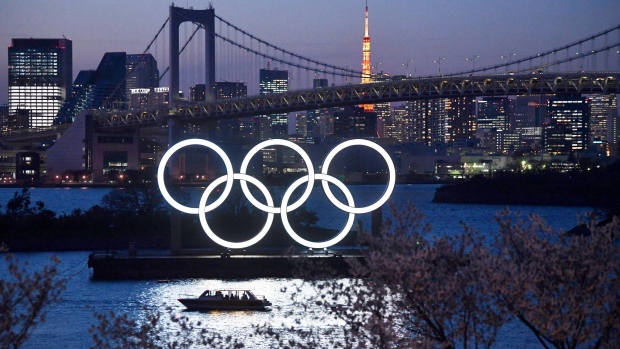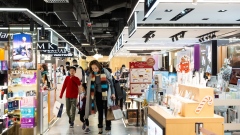Mar 23, 2021
How the Tokyo Olympics Became One Big Public Relations Quagmire
, Bloomberg News

(Bloomberg) -- From the moment it became clear last year that an unprecedented pandemic would threaten the Tokyo Olympics, organizers seemed to bungle their messaging time and time again.
In the first three months of 2020, a vacuum of information fueled weeks of speculation over the fate of the games. The special government minister appointed for the games, Seiko Hashimoto, said a delay would be “inconceivable.” Shinzo Abe, who had been counting on the event to cap a record-long run as prime minister, insisted that the competition would be held in its “complete form.”
As one qualifier after another was canceled, and with the Covid-19 virus rapidly spreading across the globe, the U.S. and Canadian teams made it clear they wouldn’t be sending athletes to Tokyo, which was expecting more than 600,000 visitors and some 11,000 competitors to attend.
The public was losing patience, with more than 70% of those polled at the time opposing the games. When Abe bowed to the inevitable in an evening phone call with International Olympic Committee President Thomas Bach, there was no news conference. Instead, he answered questions from journalists for two terse minutes in the lobby of his official residence.
“They’re treating this like routine PR, when they need to acknowledge that it’s a crisis situation,” said Akio Yamaguchi, a crisis-management consultant.
Why the 2020 Tokyo Olympics Will Be Like No Other: QuickTake
“The situation surrounding the coronavirus is constantly changing, and it’s our hope that the efforts of the government, the city of Tokyo and other stakeholders will help to mitigate spread of infections,” Masanori Takaya, a spokesman for the The Tokyo Organising Committee of the Olympic and Paralympic Games, said when asked about the public relations surrounding the event. “The committee hopes that society will return to normal as soon as possible, and that the games can be held this summer under safe and reassuring conditions as the government, the city of Tokyo and stakeholders work closely together and do their utmost to be prepared.”
As the world’s attention turned to the lockdowns happening across the world last year, and then later to the November U.S. presidential election, the Olympics faded into the background for a while. Japan eased restrictions and the arrival of a vaccine seemed to make it safe to bet on the Olympics finally going forward.
Square One
Then in January, Tokyo and other major metropolitan areas imposed restrictions again, seeking to tamp down a rising number of infections. Even so, organizers went ahead and published an Olympics Playbook that detailed how attendees could enter and move about in Japan. While the guidelines were aimed at easing concerns, the lack of mandatory quarantines or vaccine requirements also appeared to fuel more questions than answers.
All of that, however, was overtaken by a self-inflicted error, courtesy of Japan’s gaffe-prone Olympics Chief Yoshiro Mori. In a separate meeting on the same day as the Playbook’s unveiling, he jokingly complained that meetings with women take too long: “If you increase the number of women, you have to some extent limit the time for their remarks, otherwise you’ll run into trouble because it will never end.”
Mori, 83, held out for an entire week, seeking to outwait the immediate avalanche of criticism. But the growing furor on social media and criticism from around the world made it clear he would have to step down. Even then, in another questionable PR move, the power brokers in Japan’s government and sports organizations sought to install another man, even older than Mori. It was only two long weeks after the imbroglio erupted that the government and organizers realized that the only way to quell the furor was to replace Mori with minister Hashimoto, a former female athlete “born to be an Olympian.”
Yamaguchi said that Japan’s organizers have all but lost control of any messaging, with no real strategy to generate any momentum toward holding the Games. Unverified information is rampant on social media.
With just four months remaining until the opening ceremony, the Olympics remain deeply unpopular in the host country. In an Asahi poll conducted from during the past weekend, 33% said it should be scrapped all together, while just 27% of people support an Olympics this summer.
“Organizers have touted the Olympics’ economic virtues up until now, but that’s no longer convincing without any expected benefit due to the coronavirus,” said sports consultant Ryoichi Kasuga.
Even last week, the chief creative director of the Tokyo Olympics and Paralympics quit after a local magazine reported that he had made a demeaning suggestion involving a female comedian, proposing that she dress up as a pig as a play on words taking the last three letters of “Olympics.”
Better Messaging
Keiko Ishikawa, a public relations consultant, said that Tokyo 2020 is now more responsive toward media under Hashimoto, who has started holding weekly news conferences and vowed to change the atmosphere surrounding the games. Still, there’s plenty of room for improvement, Ishikawa said.
“The organizing committee can even improve things starting now if they analyze and effectively select their media,” Ishikawa said. Social media influencers should be considered as an option for delivering information to specific groups, she said.
The most widely telegraphed move during the saga has been the decision not to allow spectators from overseas to attend the games, which are scheduled to start July 23. Leaks from the govenment, and tacit approval from the public wary of potentially infected people descending on Tokyo also made it a relatively easy decision.
Read more: Team Japan’s Yamashita Is No Stranger to Olympic Frustration
Athletes are also frustrated, Dai Tamesue, a former sprinter who competed in three Games for Japan, said in an interview with Bloomberg News. The necessity of whether to hold the Olympics and Paralympics is different in the pandemic environment, and it’s necessary to consider the need to hold the games versus the risk of infections, he said.
“I want them to clearly say why they are holding the Olympics,” Tamesue said.
©2021 Bloomberg L.P.






















